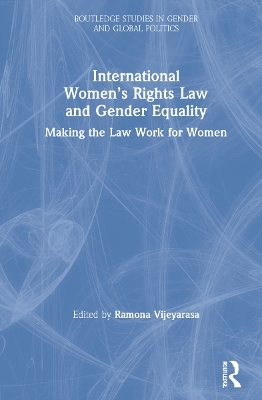
International Women’s Rights Law and Gender Equality
Routledge (Verlag)
978-0-367-54942-8 (ISBN)
The law is a well-known tool in fighting gender inequality, but which laws actually advance women’s rights? This book unpacks the complex nuances behind gender-responsive domestic legislation, from several of the world’s leading experts on gender equality.
Drawing on domestic examples and international law, it provides a primer of theory alongside tangible and practical solutions to fulfil the promise of the law to deliver equality between men and women. Part I outlines what progress has been made to date on eradicating gender inequality, and insights into the law’s potential as one lever in the global struggle for equality. Parts II and III go on to explore concrete areas of law, with case studies from multiple jurisdictions that examine how well domestic legislation is working for women. The authors bring their critical lens to areas of law often considered from a gender perspective – gender-based violence, women’s reproductive health, labour and gender equality quotas – while bringing much-needed analysis to issues often ignored in gender debates, such as taxation, environmental justice and good governance. Part IV seeks to move from a theoretical goal of greater accountability to a practical one. It explores both accountability for international women’s rights norms at the domestic level and the potential of feminist approaches to legislation to deliver laws that work for women.
Written for students, academics, legislators and policymakers engaged in international women’s rights law, gender equality, government accountability and feminist legal theory, this book has tremendous transformative potential to drive forward legal change towards the eradication of gender inequality.
Ramona Vijeyarasa is a global scholar of gender equality. She is a Senior Lecturer in the Faculty of Law at the University of Technology Sydney, Australia. Her research has helped shape theory and practice in areas of migration and trafficking, human rights and international women’s rights. Ramona is the Chief Investigator behind the Gender Legislative Index, a tool used to rank and score legislation for its gender-responsiveness. She is the author of the academic best-seller Sex, Slavery and the Trafficked Woman: Myths and Misconceptions about Trafficking and its Victims (2015) and a plethora of academic, policy and general media publications on law and gender issues. Ramona has been the recipient of a number of awards and grants, including from the Academy of the Social Sciences of Australia (2020–2021) and the Australian Department of Foreign Affairs and Trade (2020–2022). She was the 2020 Women’s Leadership Institute of Australia Research Fellow. Before joining academia, Ramona held several positions related to women’s rights in international organisations, and local and international NGOs.
Foreword Part I. Women and the Law: Addressing Inequality Chapter 1. In Pursuit of Gender-Responsive Legislation: Transforming Women’s Lives Through the Law Chapter 2. Women’s Rights – The State of Play: How Far Have We Come Since the Beijing Declaration? Part II. Legislating for Women: Successes and Setbacks in Delivering Gender-Responsive Outcomes for Women Chapter 3. Domestic Violence Law: When Good Intentions Go Awry in Practice Comment: Promoting Safety and Accountability: Clarity, Consistency and Interconnected Laws Chapter 4. Towards a Gender-Transformative Approach to Abortion: Legislative Perspectives from South Asia and Sub-Saharan Africa Comment: Gender-Transformative Law Reform as Healthcare Chapter 5. Employing the Law for Women: Gender, Work and Legal Regulation in Australia Comment: Women and Work – How Useful is the Law? Chapter 6. Enhancing Equality in Political Life: Successes and Limitations with Electoral Gender Quotas Comment: Enhancing Equality in Public Life Part III. Legislating with Women in Mind: A Demand for Gender-Responsiveness at the Drafting Table Chapter 7. Gender, Race and Environmental Law: A Feminist Critique Comment: Gender and Queer Perspectives on the Sustainable Development Paradigm for Environmental Law Chapter 8. ‘No One Left Behind’? Gender Equality Taxation and the UN 2030 Global Agenda Comment: Tax, Gender Equality and Sharing the Costs of Care Chapter 9. Women in Anticorruption Laws: The Case for More Gender-Responsive International Treaties Comment: Perverse Reactions and the Missing Link in Gender-Smart Anticorruption Policy Part IV. Accountability for Embedding Women’s Rights in Domestic Law Chapter 10. CEDAW and Global Standards for Women’s Rights: The Convention’s Actual and Potential Influence as an Accountability Mechanism for Gender-Sensitive Legislation Chapter 11. Lighting the Spark: Reimagining the Statutory Landscape Through the Feminist Legislation Project Chapter 12. Gender Audits and Legislative Scrutiny: Do Parliamentary Human Rights Bodies have a Role to Play? Chapter 13. Conclusion – Women and the Law: The Challenges Ahead for Gender-Responsive Legislation
| Erscheinungsdatum | 27.07.2021 |
|---|---|
| Reihe/Serie | Routledge Studies in Gender and Global Politics |
| Zusatzinfo | 3 Tables, black and white; 2 Line drawings, black and white; 7 Halftones, color; 1 Halftones, black and white; 7 Illustrations, color; 3 Illustrations, black and white |
| Verlagsort | London |
| Sprache | englisch |
| Maße | 156 x 234 mm |
| Gewicht | 562 g |
| Themenwelt | Recht / Steuern ► EU / Internationales Recht |
| Recht / Steuern ► Öffentliches Recht ► Völkerrecht | |
| Sozialwissenschaften ► Politik / Verwaltung | |
| Sozialwissenschaften ► Soziologie ► Gender Studies | |
| ISBN-10 | 0-367-54942-5 / 0367549425 |
| ISBN-13 | 978-0-367-54942-8 / 9780367549428 |
| Zustand | Neuware |
| Informationen gemäß Produktsicherheitsverordnung (GPSR) | |
| Haben Sie eine Frage zum Produkt? |
aus dem Bereich


